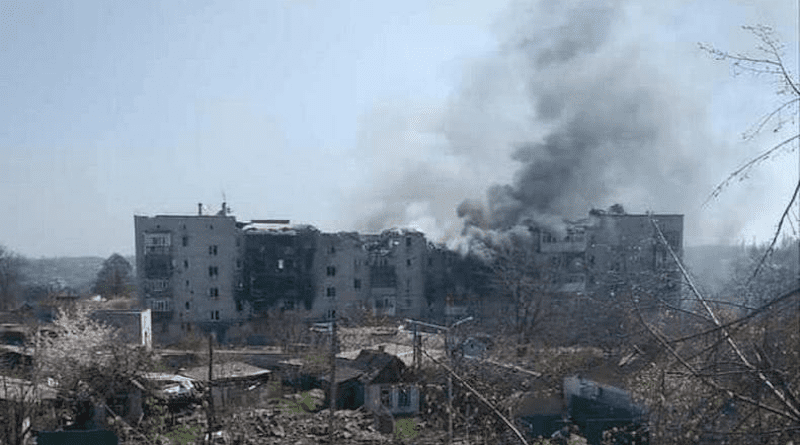Ukraine Forces To Withdraw From Sievierodonetsk
By VOA
Ukrainian troops are withdrawing from the eastern city of Sievierodonetsk after weeks of intense bombardments and street fighting with Russian troops, the regional governor said.
Luhansk governor Serhiy Gaidai said Friday troops in Sievierodonetsk had already received the order to move to new positions.
A regional Ukrainian military leader added it did not make sense to continue to hold onto Sievierodonetsk as Russian advances raised fears the city could be cut off and surrounded.
Ukraine said Russian forces had fully occupied the neighboring city of Lysychansk in the eastern Luhansk region. Moscow claimed it had encircled about 2,000 Ukrainian troops in the area.
The Russian advances appeared to bring the Kremlin closer to taking full control of Luhansk province, one of Moscow’s stated war objectives.
Meanwhile, a car bomb has killed a Moscow-imposed official in Ukraine’s southeastern city of Kherson, which is occupied by Russian troops. Dmytro Savluchenko died after his car exploded Friday. He led the Directorate for Family, Youth, and Sports for the city’s so-called military and civilian administration established by the occupying forces.
The senior official in the Russian-installed administration of Ukraine’s occupied Kherson region was killed in an apparent assassination, the deputy head of the administration told Reuters.
Two cars were damaged in the blast, which also shattered windows in nearby apartment blocks. No other casualties were reported.
No group has claimed responsibility for the attack. Representatives of Ukraine’s Defense Ministry and military intelligence have said that guerilla groups are operating in the country’s territories occupied by Russia.
Kherson sits just northwest of the Russian-annexed Crimean Peninsula and was occupied during the first week of Russia’s invasion of Ukraine, which began in February. A large part of the local population has left.
In Brussels, European leaders met Friday to prepare for further cuts in Russian gas. They also discussed limiting the impact on inflation and seeking alternative supplies, accusing Moscow of “weaponizing” energy via a supply squeeze.
On Thursday, the European Parliament voted overwhelmingly to grant European Union candidate status to embattled Ukraine, pushing it one step closer to Western allies who have been supplying it with massive amounts of armaments to help it fight off Russia’s 4-month-old invasion.
The vote favoring Ukraine was 529-45, with 14 abstentions. The European Parliament also approved EU candidacy for Georgia and Moldova.
Ukrainian President Volodymyr Zelenskyy said on Twitter this “is a unique and historic moment in Ukraine-EU relations. … Ukraine’s future is within the EU.”
And on Instagram, he said, “We have just received the candidacy. This is our victory.”
The vote came as the United States said it is sending $450 million more in military aid to Ukraine, including some additional medium-range rocket systems, on top of the $1 billion in assistance it announced a week ago.
Ukrainian Parliament chair Ruslan Stefanchuk thanked the European lawmakers for their support in a Facebook message, saying, “Ukraine is EU country. And we fight for this right not only on the battlefield but also in the legal sphere.”
In order for the three countries to join the 27-member EU bloc, they will be required to carry out a series of political and economic reforms.
European Commission President Ursula von der Leyen said Ukraine “has already implemented roughly 70% of EU rules, norms and standards.” She said, however, that much needs to be done in the areas of “the rule of law, oligarchs, anticorruption and fundamental rights.”
The European Council, which comprises the heads of all 27 EU governments, would have the final vote on Ukraine’s membership. The vote must be unanimous. Diplomats say the process could take a decade to complete.
“The Ukrainian people belong to the European family. Ukraine’s future is with the EU,” said the bloc’s foreign policy chief, Josep Borrell. “Today marks the beginning of a long journey that we will walk together.”
The EU leaders gathered in Brussels discussed the impact of Russia’s war in Ukraine on global food security, as well as additional EU economic, military and humanitarian support for Ukraine.
Prime Minister Boris Johnson said Britain was willing to help Kyiv in demining off Ukraine’s southern coast and providing insurance to ships to help transfer some of the more than 20 million tons of grain stored in the country.
Ukraine, one of the world’s top food producers, has been unable to export grain since Russia invaded on February 24. The result is a growing global food crisis. Food prices are at record highs as food shortages have left tens of millions of people struggling to eat.

